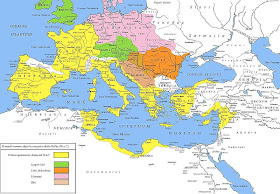THESE MAPS FROM WIKIPEDIA ARE OF THE ROMAN EMPIRE SO YOU CAN SEE WHERE HISPANIA IS IN RELATION TO ITALIA AND THE SECOND MAP SHOWS THE MOUNTAIN RANGES
Postquam Ligurés hóc modó superátí sunt, Herculés quam celerrimé prógressus est et post paucós diés ad Alpís pervénit. Necesse erat hás tránsíre, ut in Ítaliam bovés ageret; rés tamen summae erat difficultátis. Hí enim montés, quí últeriórem á citerióre Galliá dívidunt, nive perenní sunt téctí; quam ob causam neque frúmentum neque pábulum in hís regiónibus invenírí potest. Herculés igitur antequam ascendere coepit, mágnam cópiam frúmentí et pábulí comparávit et hóc commeátú bovés onerávit. Postquam in hís rébus trís diés cónsúmpserat, quartó dié profectus est, et contrá omnium opíniónem bovés incolumís in Ítaliam trádúxit.
b)
Some words have been chosen for special consideration and are listed below. For the words not included in this list please refer to the WORDLIST in PAGES TOP RIGHT SIDE BAR.
quam celerrime – quam followed by a superlative adjective means ‘as (something) as possible’ expressing the highest possible degree, so here we have , 'as rapidly as possible.'
has transire – literally ‘to get across these’; these being the Alps feminine plural accusative.has , the subject being hás tránsíre.
citeriore. – because northern Italy was occupied by Gallic tribes, the Romans called it ‘Gallia Citerior’ which means nearer Gaul when compared with farther Gaul; it is sometimes translated as 'Hither Gaul’. Citerior, -ius is the comparative from citra, ‘on this side of’, and ulterior, -ius is the comparative of ultra, ‘beyond’ meaning therefore ‘farther off’.
tecti- is a predicate adjective joined to montes (masculine plural nominative) by sunt. It means literally ‘roofed’ but you could put covered and comes from the third declension verb tego, tegere, texi, tectus; I expect you can guess that the second declension neuter noun tectum i means ‘roof’.
neque ... necque – neither ... nor
pabulum – gen i , second declension noun, meaning food, fodder.
copiam – copian in the singular means supply and in the plural oftern means forces, or troops in military contexts.
commeatu – ablative of comeatus gen us, fourth declension noun masculine, means supplies, provisions. hoc commeatu – ‘with this supply’ (ablative case) is probably better expressed in English as a plural ‘with these supplies, with these provisions’.
his rebus – quite literally ‘these things’ but probably better translated as ‘with these preparations’’
consumpserat – third person singular pluperfect of the verb consumo, -sumere, -sumpsi, -sumptus, ‘take completely, use up, consume, spend’.. The pluperfect is sometimes used with postquam when the lapse of time is mentioned.
quarto die – ablative to express time when ‘on the fourth day’.
omnium opinionem.- you might have expected these two words to be the other way round; when the word order is changed it is often, as here, to emphasise the word which has been moved, in this case omnium which is made emphatic by being placed first.
traduxit – third person singular perfect tense of the verb traduco, -ducere, -duxi, -ductus, to lead across, therefore the meaning is ‘he led across’.
c)
Note: This section is not translated into idiomatic English but is intended, together with the notes, to give you the gist of the meaning; you can then come up with your own improved translation.
Postquam Ligures hoc modo superati sunt,
After the Ligurians were overcome in this way,
Hercules quam celerrime progressus est
Hercules advanced as fast as possible
et post paucos dies ad Alpis pervenit.
and after a few days he reached the Alps.
Necesse erat has transire,
it was necessary to get across (these)
ut in Italiam boves ageret;
in order to lead the cattle into Italy
res tamen summae erat difficultatis.
the matter however was of the utmost difficulty,
Hi enim montes,
for these mountains,
qui ulteriorem a citeriore Gallia dividunt,
which divide further Gaul from nearer Gaul,
nive perenni sunt tecti;
are roofed all year with snow;
quam ob causam neque frumentum
for which reason neither corn
neque pabulum in his regionibus inveniri potest.
nor can be brought into these regions.
Hercules igitur antequam ascendere coepit,
Hercules therefore before he began climbing
magnam copiam frumenti et pabuli comparavit
got ready a great supply of corn and fodder
et hoc commeatu boves oneravit.
and loaded the cattle with these provisions.
Postquam in his rebus tris dies consumpserat,
After three days had been taken up with these preparations,
quarto die profectus est, et contra omnium opinionem
on the fourth day he set out, and contrary to the expectation of all
boves incolumis in Italiam traduxit.
he led the cattle safely across into Italy.
d) The following section is for you to copy and translate.
Postquam Ligures hoc modo superati sunt,
Hercules quam celerrime progressus est
et post paucos dies ad Alpis pervenit.
Necesse erat has transire,
ut in Italiam boves ageret;
res tamen summae erat difficultatis.
Hi enim montes,
qui ulteriorem a citeriore Gallia dividunt,
nive perenni sunt tecti;
quam ob causam neque frumentum
neque pabulum in his regionibus inveniri potest.
Hercules igitur antequam ascendere coepit,
magnam copiam frumenti et pabuli comparavit
et hoc commeatu boves oneravit.
Postquam in his rebus tris dies consumpserat,
quarto die profectus est, et contra omnium opinionem
boves incolumis in Italiam traduxit.


This comment has been removed by the author.
ReplyDelete(messed up on spelling in my earlier comment, deleted it)
ReplyDeletein the inter-linear translation, for the phrase "res tamen summae erat difficultatis," tamen is translated twice
Thank you for pointing out this mistake; I have altered the gist translation.
ReplyDeleteAngela